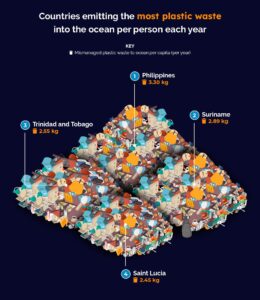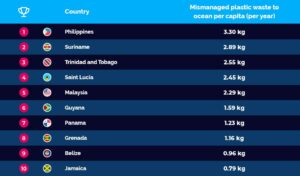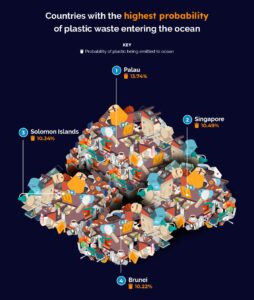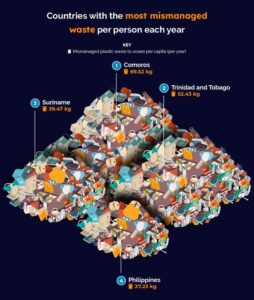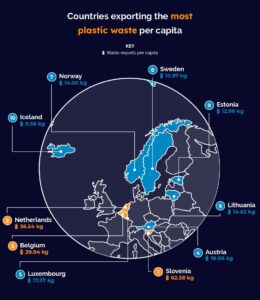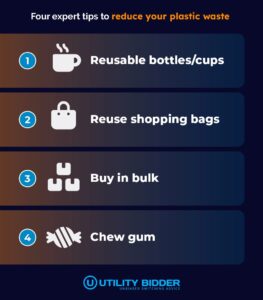In the past, people and businesses have often prioritised convenience and cost-effectiveness at the expense of the environment. For example, many companies will conduct an electricity business comparison to get the best deal, but not the most environmentally friendly choice. Of course, it’s good to compare business energy prices. However, we must work together to stop pollution and protect the environment.
One of the most damaging forms of pollution is plastic waste. Several measures have been introduced to tackle this, such as plastic bag charges when shopping and discounts for bringing reusable coffee cups into cafes. However, there is still a lot of work to be done, and some countries are further ahead than others.
We wanted to know which countries are contributing to plastic pollution the most. We’ve looked at the probability and amount of plastic waste going into the ocean, the amount of mismanaged plastic waste, and the amount of exported plastic waste. We’ve also got some expert tips to help you reduce your plastic waste.
The Philippines disposes more plastic waste into the ocean than any other country, with 3.3kg per person every year
The amount of plastic waste that enters the oceans each year is alarming, and it’s already threatening the sea’s wildlife. Countries worldwide are trying to combat this issue by placing a more significant emphasis on recycling. However, there is still plenty of work still to be done. Utility Bidder looked at the countries emitting the most plastic waste into the oceans per person each year.
1. The Philippines – 3.30kg per capita of plastic waste enters the ocean
The Philippines takes the top spot, emitting 3.30kg of plastic waste into the ocean per person each year. In total, more than 350,000 tonnes of plastic waste enter the ocean from the Philippines each year, which is 36% of the world’s total. In 2023, the Philippines introduced the “Extended Producer Responsibility” law, which leaves businesses fully responsible for the life cycle of their products, including waste management.
2. Suriname – 2.89kg per capita of plastic waste enters the ocean
In second place is Suriname, which emits 2.89kg of plastic waste into the ocean per person each year. The total amount of plastic waste that enters the ocean in Suriname is significantly lower when compared to the Philippines, at just 1,677 tonnes. This South American country is covered in tropical forest, earning itself a reputation as one of the greenest countries in the world. However, its record on waste management contradicts this title.
3. Trinidad and Tobago – 2.55kg per capita of plastic waste enters the ocean
Our top three is completed by Trinidad and Tobago, where 2.55kg of plastic waste is disposed of into the ocean per person each year. In 2019, Trinidad and Tobago joined the UN Environment’s Clean Seas campaign in an effort to combat its plastic problem. The Caribbean country is also educating its population about the importance of separating household waste.
The probability that plastic will be emitted into the ocean is higher in Palau than in any other country, at a 13.74% chance
The chance of mismanaged plastic waste reaching the ocean can change depending on the climate, terrain, and distance to river basins. We’ve revealed the countries with the highest chance of plastic being emitted to the ocean.
1. Palau – 13.74% probability of plastic being emitted into the ocean
Palau takes the top spot with a 13.74% chance of plastic being disposed of into the ocean. The small oceanic country produces just seven tonnes of plastic each year, just 0.39kg per capita. Despite having the highest probability of any country, it’s a very environmentally conscious country that is keen to preserve the marine sanctuary around it.
2. Singapore – 10.49% probability of plastic being emitted into the ocean
In second place is Singapore, with a 10.49% chance of plastic ending up in the ocean. Annually, Singapore produces just 164 tonnes of plastic waste, equivalent to 0.03kg per person each year. As part of its ‘Zero Waste Masterplan’, Singapore aims to recycle 70% of its plastic waste by 2030. However, in 2019 just 4% of all plastic waste was recycled.
3. Solomon Islands – 10.34% probability of plastic being emitted into the ocean
Completing our top three is the Solomon Islands, with a 10.34% chance of plastic being emitted to the ocean. The Solomon Islands produces 100 tonnes of plastic each year, which is 0.15kg per person annually. Plastic pollution is a real problem here, with plastic bags making up 12% of the main landfill in the capital city, Honiara. In 2019, the president announced that single-use plastics would be banned. However, they still have a long way to go before the problem is tackled.
Comoros mismanages 70kg of plastic waste per person each year, more than any other country
Mismanaged plastic waste is waste that is littered or disposed of in uncontrolled landfills. When plastic waste is mismanaged, the possibility of it entering the ocean increases. We’ve revealed the countries that mismanage the most plastic waste per capita each year.
1. Comoros – 69.52kg of mismanaged plastic waste per capita each year
The country which mismanages the most plastic waste is Comoros, with just under 70kg per person annually. Comoros is home to many coral reefs. However, the plastic pollution is causing a real threat to wildlife. Comoros have taken measures to reduce plastic waste, banning the production, importation, and distribution of non-biodegradable plastic bags.
2. Trinidad and Tobago – 52.43kg of mismanaged plastic waste per capita each year
Trinidad and Tobago takes second place, annually mismanaging 52.43kg of plastic waste per person. To counter the extreme levels of plastic pollution in Trinidad and Tobago, the United Nations Environment Programme has developed an app called ‘Tide Turners’, which challenges users to record their plastic consumption and develop a plan to reduce it.
3. Suriname – 39.47kg of mismanaged plastic waste per capita each year
Suriname completes our top three, with almost 40 kg of mismanaged plastic waste per person yearly. On December 5th 2020, Suriname held a ‘Run Out of Waste’ day to increase awareness of the issues plastic pollution causes and to help clean the area.
Slovenia exported 63kg of plastic waste per person, more than any other country in the world
Many countries worldwide export their waste. The reason is that it’s often cheaper to export the waste rather than build infrastructures to manage it while also reducing the amount of waste going to landfills in the exporting country. In this section, we’ve revealed the countries that export the most waste per person.
1. Slovenia – 62.58kg of plastic waste was exported per person in 2021
Taking the top spot is Slovenia, which exported 62.58kg of plastic waste per person in 2021. Slovenia exported just over 130,000 tonnes of plastic waste, 50,000 tonnes less than the year before, which shows considerable improvement in the small European nation. Most of Slovenia’s plastic waste goes to Asian countries such as Indonesia, Malaysia, and Vietnam.
2. The Netherlands – 36.54kg of plastic waste was exported per person in 2021
The Netherlands takes second place, with 36.54 kg of waste exported per person in 2021. Almost 630,000 tonnes of plastic waste was exported, more than 200,000 tonnes higher than in 2020. Indonesia was the biggest recipient of the Netherlands’ plastic waste, followed by Vietnam.
3. Belgium – 29.94kg of plastic waste was exported per person in 2021
Completing our top three is Belgium, with almost 30 kg of plastic waste exported per person in 2021. Belgium’s total exported plastic waste was 348,000 tonnes, which has hardly changed since 2018. Turkey is the primary importer of Belgium’s plastic waste, receiving 46.8% of the country’s total, and is followed by Malaysia (20.3%) and Vietnam (17.4%).
Four expert tips to reduce your plastic waste
To help solve this global issue, we should all be doing our part to reduce our plastic waste intake. That’s why the experts at Utility Bidder have put together some tips to help you reduce your plastic waste.
1. Reusable bottles/cups
Buying reusable water bottles or coffee mugs is one of the easiest ways to reduce plastic waste. 1,500 plastic bottles are thrown away every second, and just one in 400 coffee cups are recycled. Carrying a reusable water bottle with you can save you money as there are many places in public where you can refill your water bottle for free. Many cafes have also introduced discounts for those who use reusable coffee cups.
2. Reuse shopping bags
Each day, more than 250 marine animals are killed by plastic bags, showing just how dangerous they can be. Since the UK introduced a plastic bag charge, there has been an 85% drop in their use. Remembering your plastic bags can be tricky, so we recommend leaving them by the front door or in your car.
3. Bulk Buy
There are many benefits to bulk buying your foods. The more you buy, the less you pay, which makes it an attractive option financially, especially during the cost of living crisis. Also, it can help you reduce your plastic waste as large containers can carry more produce while using less plastic. Bulk buying can be difficult, especially for food which perishes quickly, however, using your freezer or cooking in bigger batches can help tackle this. If you prepare all your meals in one go, then it can also save you time during the week.
4. Chewing gum
Chewing gum can quickly and conveniently keep your breath smelling fresh. People in the UK are the second biggest consumers of gum, averaging 130 sticks per person each year. Furthermore, almost 90% of Britain’s streets are covered in gum. The majority of chewing gum on the market contains plastic, which means it usually can be recycled. Although it would be better to stop buying chewing gum altogether, aiming to reduce your amount and ensure you recycle it is a small but effective way of reducing your plastic waste.
Methodology
Utility Bidder used Our World in Data for the figures above. You can view the full study here.

